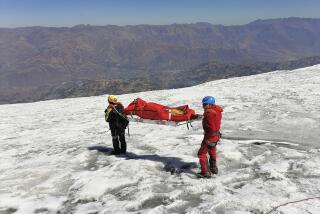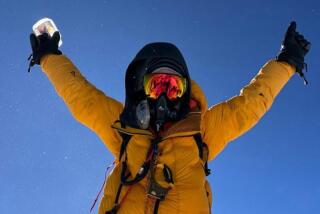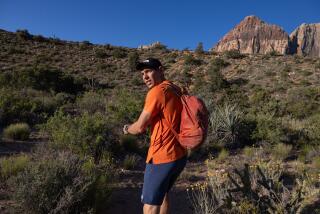Dick Bass dies at 85; Texas oilman was first to scale ‘seven summits’
- Share via
Dick Bass, a poetry-spouting Texas oilman who was the first climber to scale the highest peak on each of the seven continents and for a time was the oldest to top Mt. Everest, has died. He was 85.
Bass died Sunday at his home in Dallas. He had pulmonary fibrosis, according to a statement from Snowbird, the Utah ski resort he started in 1971 and owned until 2014.
At various times in his career, he also was a part-owner of ski areas in Vail and Aspen. He owned ranches in Texas and coal mines in Alaska. He grew up around the oil fields of Oklahoma, where his father, Harry W. Bass, developed portable drilling rigs and became one of the largest natural-gas processors in the U.S.
“I chose my father very carefully,” Bass later said. “He gave me the perfect launching pad.”
Often described as a larger-than-life character, Bass blended relentless enthusiasm and profound optimism with operatic intentions and raw guts.
“He is an honest, likable man haunted by a need to keep proving himself,” the Boston Globe said in 2000. “He will bring himself to tears talking about the value of integrity and the gift of life.”
In an interview with The Times, David Breashears, one of the world’s top climbers and the first American to ascend Everest twice, described Bass as “a poet, a visionary and a mountaineer with the heart of a lion.”
An active skier and tennis player, Bass never trained for his grueling climbs.
“I was befuddled by his astonishing ability to perform at high altitude,” said Breashears, who accompanied Bass at Everest. “I had to tell myself I wasn’t imagining it. It made no sense to me.”
Bass, who said he “never planned to climb anything, except out of bed in the morning,” was 51 when he started his record-setting expeditions. He was 55 when he bagged Everest on April 30, 1985, having already climbed Aconcagua, in South America; Denali, in Alaska; Elbrus, in Russia; Kilimanjaro, in Africa; Kosciuszko, in Australia; and Vinson Massif, in Antarctica.
Frank Wells, his main climbing partner, succeeded on all of the peaks but Everest. Wells, who quit his job as president of Warner Bros. Studio for the grand effort, also was a novice.
“At first glance, I just thought they were a couple of dilettantes having a midlife crisis,” said Rick Ridgeway, a renowned climber who was hired by the pair to organize and guide several of the treks.
After a little time with them, Ridgeway said, he changed his mind.
“They had hardly any chance of pulling it off, but they were going to do it with verve, vigor and no looking back. They became mentors to me; their example was a guide to what passion, commitment and tenacity can get you.”
On Aconcagua, Bass stumbled in a hole, painfully shredded a leg muscle, and hobbled down 10,000 feet before Argentine soldiers on maneuvers loaded him onto a mule and led him 20 miles to a road. In one of Bass’ three attempts on Everest, Marty Hoey, a tough female guide who had taught Bass some hard lessons on Denali, plunged 6,000 feet to her death. Her body was never found.
“That will be with me till the day I die,” said Bass, who recruited her for his climbs when she was on the ski patrol at Snowbird. “I just admired her so much. I respected her so much.”
At exhausting times, Bass would lift his party’s spirit by breaking into verse. On Vinson Massif in Antarctica, the temperature was at least 40 degrees below zero, water in the canteens was frozen solid, and biting on a candy bar “was like chomping down on a bar of steel,” Ridgeway wrote in “Seven Summits,” a 1986 book he wrote with Bass and Wells.
“We were doing a little war dance, stomping our feet and swinging our arms. Then Bass got poetic:
Talk of your cold, through the parka’s fold, it stabbed like a driven nail...
It was a line from Robert W. Service’s “The Cremation of Sam McGee,” one of the Yukon bard’s many sagas that Bass had memorized and would recite, unbidden, on the trail and in the tent.
When Bass and Ridgeway reached the top and wrapped each other in a bear-hug, Bass dipped into “Sam McGee” again:
When our eyes we’d close, then the lashes froze, ‘til sometimes we couldn’t see....
Richard Bass was born in Tulsa, Okla., on Dec. 21, 1929, and wanted to be a boys prep school teacher.
“I was going to be a Chips reincarnate,” he told the publication Utah Business in 1991. “Did you ever see ‘Dead Poets Society?’ That was me. I was going to be that very thing.”
Instead, he studied geology at Yale and did graduate work in petroleum engineering at the University of Texas. He served on a Navy aircraft carrier during the Korean War and had his first taste of climbing — though he always called himself “a high-altitude trekker” rather than a climber — at Mt. Fuji in Japan.
In 1962, Bass was among the original investors in Vail. He and his brother Harry Jr. later developed the nearby Beaver Creek ski resort.
Developing Snowbird, he came close to bankruptcy a number of times. After an around-the-world trip with his adult children, he realized that “I had really been hammered down — by bankers, by competitors, by environmental groups, by people with their hands in the cookie jar. Plus, I had a divorce thrown in there too.”
Physical achievement — whether on mountains, or running the original marathon route laid out by the ancient courier Phidippides, or swimming the Hellespont a la Lord Byron — was an antidote.
“Nobody thwarted me as I struggled up the mountainside,” he wrote. “I had definite goals and I realized a tangible sense of accomplishment.”
Over the years, Bass encountered his share of critics. In his popular book “Into Thin Air,” author Jon Krakauer dismissively described Bass as a wealthy Texan who was “ushered to the top of Everest.”
“Previously, Everest had by and large been the province of elite mountaineers,” Krakauer wrote. “Bass’ ascent changed all that.”
Phil Powers, a mountaineer who is chief executive of the American Alpine Club, said Bass’s well-publicized pursuit of the seven summits “launched a whole new world of adventure travel and a whole new business channel for guides.”
He said the quest had a healthy ripple effect on people who weren’t about to brave Antarctica but might be inspired to take a weekend hike.
Bass was blunter about his critics. “They resent some 55-year-old yahoo from Texas climbing these mountains they’d dreamed about. When I see guides now, they hug me because the seven summits made the mountain-guiding profession. It made them!”
Bass’ first two marriages ended in divorce. He is survived by his wife, Alice, four children, and 13 grandchildren as well as five stepchildren and 11 step-grandchildren.
Bass’ climbing partner Frank Wells became president of the Walt Disney Co. in 1984. He died in a helicopter crash 10 years later.
In his later years, Bass planned to return to Everest and reclaim his title as its oldest climber, which had since been surpassed. He never did, but he was active until his illness forced him into a wheelchair.
According to one widely circulated story, he was on a cross-country flight when, in his loquacious way, he deluged his seatmate for hours with details of his treks on all seven continents. As they were about to land, he realized he hadn’t paused to ask his new friend anything about himself, his job, or even his name.
“That’s OK,” the man responded, extending his hand. “I’m Neil Armstrong.”
Twitter: @schawkins
More to Read
Start your day right
Sign up for Essential California for the L.A. Times biggest news, features and recommendations in your inbox six days a week.
You may occasionally receive promotional content from the Los Angeles Times.







